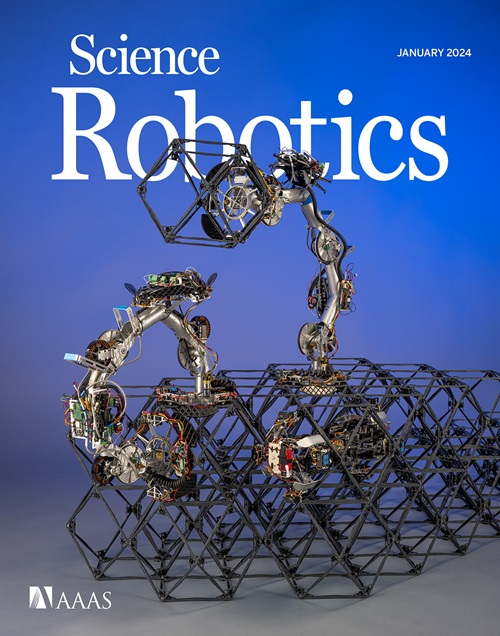Online tree-based planning for active spacecraft fault estimation and collision avoidance
IF 26.1
1区 计算机科学
Q1 ROBOTICS
引用次数: 0
Abstract
Autonomous robots operating in uncertain or hazardous environments subject to state safety constraints must be able to identify and isolate faulty components in a time-optimal manner. When the underlying fault is ambiguous and intertwined with the robot’s state estimation, motion plans that discriminate between simultaneous actuator and sensor faults are necessary. However, the coupled fault mode and physical state uncertainty creates a constrained optimization problem that is challenging to solve with existing methods. We combined belief-space tree search, marginalized filtering, and concentration inequalities in our method, safe fault estimation via active sensing tree search (s-FEAST), a planner that actively diagnoses system faults by selecting actions that give the most informative observations while simultaneously enforcing probabilistic state constraints. We justify this approach with theoretical analysis showing s-FEAST’s convergence to optimal policies. Using our robotic spacecraft simulator, we experimentally validated s-FEAST by safely and successfully performing fault estimation while on a collision course with a model comet. These results were further validated through extensive numerical simulations demonstrating s-FEAST’s performance.
基于树状结构的在线规划,用于主动式航天器故障估计和避免碰撞。
在不确定或危险环境中运行的自主机器人受到状态安全的限制,必须能够以时间最优的方式识别并隔离故障部件。当基本故障模糊不清并与机器人的状态估计交织在一起时,就必须制定能够区分同时发生的致动器和传感器故障的运动计划。然而,故障模式和物理状态不确定性的耦合产生了一个约束优化问题,用现有方法来解决这个问题具有挑战性。我们将信念空间树搜索、边际滤波和集中不等式结合到我们的方法中,即通过主动传感树搜索进行安全故障估计(s-FEAST),这是一种通过选择能提供最多信息观察结果的行动来主动诊断系统故障的计划器,同时还能执行概率状态约束。我们通过理论分析证明了这种方法的合理性,并展示了 s-FEAST 对最优策略的收敛性。利用我们的机器人航天器模拟器,我们在与模型彗星的碰撞过程中安全、成功地进行了故障估计,从而在实验中验证了 s-FEAST。这些结果通过大量的数值模拟得到了进一步验证,证明了S-FEAST的性能。
本文章由计算机程序翻译,如有差异,请以英文原文为准。
求助全文
约1分钟内获得全文
求助全文
来源期刊

Science Robotics
Mathematics-Control and Optimization
CiteScore
30.60
自引率
2.80%
发文量
83
期刊介绍:
Science Robotics publishes original, peer-reviewed, science- or engineering-based research articles that advance the field of robotics. The journal also features editor-commissioned Reviews. An international team of academic editors holds Science Robotics articles to the same high-quality standard that is the hallmark of the Science family of journals.
Sub-topics include: actuators, advanced materials, artificial Intelligence, autonomous vehicles, bio-inspired design, exoskeletons, fabrication, field robotics, human-robot interaction, humanoids, industrial robotics, kinematics, machine learning, material science, medical technology, motion planning and control, micro- and nano-robotics, multi-robot control, sensors, service robotics, social and ethical issues, soft robotics, and space, planetary and undersea exploration.
 求助内容:
求助内容: 应助结果提醒方式:
应助结果提醒方式:


